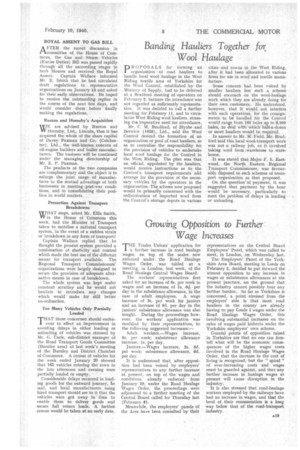Banding Hauliers Together for Wool Haulage
Page 21

If you've noticed an error in this article please click here to report it so we can fix it.
PR 0 POS ALS for forming an organization of road hauliers to handle local wool haulage in the West Riding textile area of Yorkshire for the Wool Control, established by the Ministry of Supply, had to be deferred at a Bradford meeting ofoperators on February 2, because the attendance was not regarded as sufficiently representative. It was decided to call a further meeting for February 11, and to circularize West Riding wool hauliers, stressing the imperative need for attendance.
Mr. C. M. Bradford, of Blythe and Berwick (1928), Ltd., said the Wool Control desired the formation of an organization or pool of road hauliers, so as to centralize the responsibility for the provision of vehicles to undertake local wool haulage for the Control in the West Riding. The plan was that an official, appointed by the hauliers, would receive instructions as to the Control's transport requirements arid arrange for the provision of the necessary vehicles by the operators in the organization. The scheme now proposed would be primarily concerned with the redistribution of imported wool from the Control's storage depots in various cities and towns in the West Riding, after it had been allocated to various firms for use in wool and textile manufacture.
Some concern had been voiced by smaller hauliers lest such a scheme should encroach on the wool-haulage work which they are already doing for their own customers. He understood, however, that it would not interfere with such operations, for the consignments to be handled for the Control would range from 100 bales up to 8,000 bales, to deal with whichhalf-a-dozen or more hauliers would be required.
In answer to Mr. M. Field., Mr. Bradford said this local wool-transport work was not a railway job, as it involyed taking wool from warehouse to warehouse.
It was stated that Major F. S. Eastwood, the North Eastern Regional Transport Commissioner, was favourably disposed to such schemes of transport organization as that proposed.
On the question of payment, it was suggested that payment by the hour would be necessary, particularly to meet the problem of delays in loading or unloading.




























































